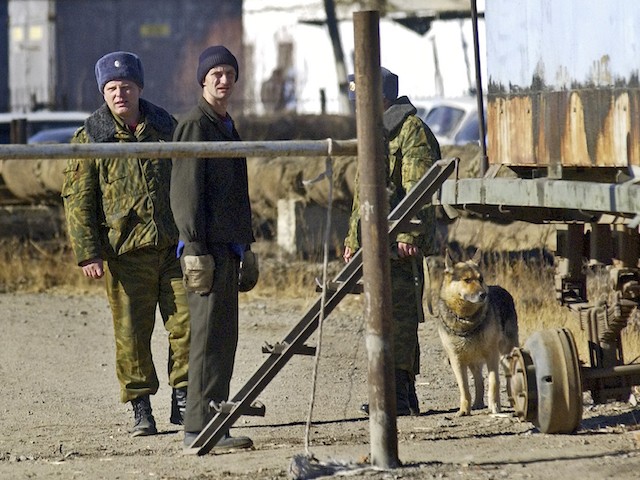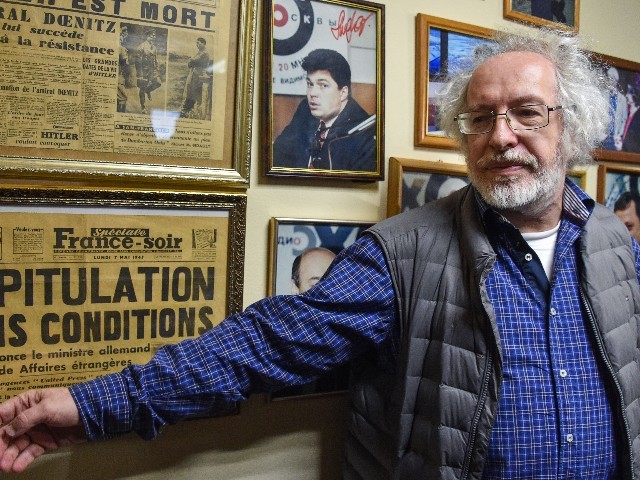The Russian Parliament on Friday approved a bill that would impose prison sentences of up to 15 years for “spreading fake news about the Russian Armed Forces and the military operation in Ukraine,” as the Moscow Times summarized it.
“A group of people that use their position to spread fake information or distribute fake news with falsified evidence could be jailed for 5 to 10 years. If the falsified information has grave consequences, the punishment will be 10 to 15 years in prison,” the Moscow Times reported.
The Duma furnished some examples of punishable “fake news,” including “old photos of burned military equipment of the Ukrainian Armed Forces that have been photoshopped to have markings of the Russian military,” and eight-year-old footage from the war-torn Donbas region of eastern Ukraine repurposed to look like fresh “crimes perpetrated by the Russian military.”
Russia’s state-run Tass news service said other punishments for “fake news” mentioned in the bill include hefty fines and “obligatory labor for up to three years.”
Tass quoted Duma policy chief Alexander Khinshtein saying, “The law applies to all citizens, not only Russian citizens, because we are talking about actions against Russia.”
Khinshtein admitted Russia’s ability to punish foreigners for violating its speech codes was limited but noted the statute of limitations on offenses would be “up to 15 years,” so Russian prosecutors would have plenty of time to stalk foreign offenders.
Radio Free Europe (RFE) said the bill also makes it a crime to “make calls against the use of Russian troops to protect the interests of Russia” or “discrediting such use.” Those offenses would carry penalties of up to three years in prison.

In this file photo, guards and an unidentified inmate stand near the entrance to the prohibited area around the prison in the town of Krasnokamensk in Siberia’s Chita region near the Chinese border, Russia (AP Photo/Denis Gukov, File).
RFE noted the Russian government has already used regulatory agency Roskomnadzor to tighten its grip on media during the attack on Ukraine. Roskomnadzor has issued directives forbidding the use of words like “invasion” or “war” to describe what dictator Vladimir Putin prefers to call a “special military operation.”
Roskomnadzor has also “limited” access to foreign media, including RFE, and restricted access to foreign smartphone apps on the Google and Apple stores.
On Thursday, venerable liberal radio station Ekho Moskvy (“Echo of Moscow”) was crushed by Roskomnadzor in retaliation for its reporting on the Ukraine war.

Echo of Moscow editor-in-chief Alexei Venediktov makes a statement in the office of Russian Echo of Moscow radio station in Moscow (VASILY MAXIMOV/AFP via Getty Images).
Ekho Moskvy has been operating since the last days of the Soviet Union, maintaining a generally peaceable relationship with the Kremlin while occasionally providing coverage and commentary that displeased it.
The popular radio station was shut down after Roskomnadzor accused it of spreading “deliberately false information about the actions of Russian military personnel” and disseminating “information calling for extremist activity,” which are essentially the actions that would be criminalized and punished with prison time under the bill approved by the Duma. Ekho Moskvy’s board of directors voted on Thursday to liquidate the company.
The “fake news” bill passed through both houses of the Russian Parliament on Friday and could be signed into law by Russian leader Vladimir Putin as early as Saturday.

COMMENTS
Please let us know if you're having issues with commenting.